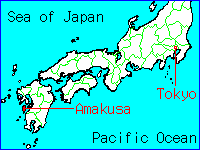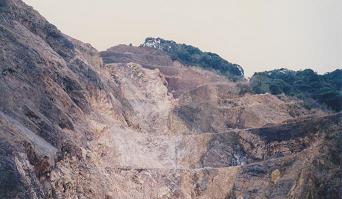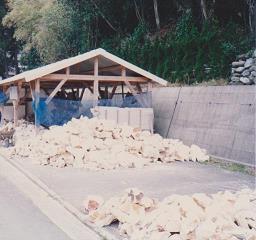Pottery stone is a raw material for porcelain to porcelainize without mixing other materials, and is metamorphic rock which was hydrothermally altered from rhyolite group.
Amakusa pottery stone is one of representative pottery stones in Japan, and has been used as the main raw material of high quality porcelain such as Arita porcelain and of insulator for high voltage.
The major mineral compositions of this consist of quartz, sericite and kaolin, and the refractoriness is about SK26.
Recently, the sources of high-grade pottery stone has become scarce, so the effective use of low-grade stone has been required very strongly.
It is found that the various unused low-grades of pottery stone contain feldspar, limonite, siderite, calcite and others as impurities, and the refractoriness varies from SK12 to SK26 depending on the impurity content.
| 


|
Joint research named "Technology for utilizing of low-grade ceramic material" was carried out by Kyushu National Industrial Research Institute (KNIRI, the present National Institute of Advanced Industrial Science and Technology, Kyushu) in cooperation with prefectural research institutes of Saga, Nagasaki, Kumamoto and Kagoshima and private companies during six years since 1980.
Various kinds of pottery stone from special-grade to low-grade or even unutilized one, were sampled by KNIRI in cooperation with Amakusa Pottery Stone Cooperation and Kumamoto Prefectural Industrial Research Institute, since 1980.
The collected samples were chracterized after crushing and milling.
Mineral and chemical compositions of the samples were measured by X-ray powder method (XRD) and X-ray fluorescence analysis (XRF), respectively.
Thermal properties of the samples were measured using thermobalace (TGA) and thermal expansion meter (TMA).
Refractoriness of the samples were estimated using the measured valuse of thermal expansion.
In this database, all data of 218 samples are publicized.
Furthermore, the basic data such as X-ray diffraction, thermal expansion and thermal gravity patterns are included.
In addition, this database, in the Materials Research Institute for Sustainable Development of the National Institute of Advanced Industrial Science and Technology, as part of the research, I've created.
Kunio KIMURA Dr., kmr@kumin.ne.jp
Last updated of the data: November 2004., Revised: April 2016.
| |||||||||||||||